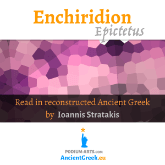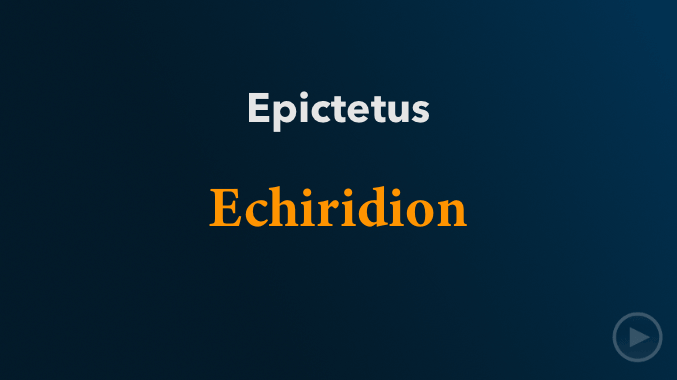• Enchiridion •
• Epictetus •

Duration: 1 hour 02min
Unabridged
Recorded: 2024
Price : $/€ 42 – 60
About Epictetus' Enchiridion
The "Enchiridion" of Epictetus, compiled by his student Arrian, serves as a concise manual of Stoic philosophy. It advocates for living a virtuous life by focusing on what is within our control, namely our thoughts, emotions, and actions, while accepting external events and circumstances with equanimity. Epictetus emphasizes the importance of aligning our desires and aversions with reason, cultivating inner tranquility, and embracing change and adversity as opportunities for growth. Central to his teachings is the concept of living in accordance with nature, which involves mastering our own minds, practicing self-awareness and mindfulness, and treating others with kindness and empathy. Ultimately, the "Enchiridion" offers timeless wisdom on how to achieve eudaimonia, or flourishing, through the cultivation of virtues such as wisdom, courage, temperance, and justice.
You can follow the text in an English translation, online at the Archive.org website.
about Epictetus
Epictetus (Gr.: Ἐπίκτητος) Epictetus was a Greek Stoic philosopher who lived from around 55 to 135 AD. Born into slavery in Hierapolis, Phrygia (present-day Turkey), he eventually gained his freedom and became one of the most influential thinkers of the Stoic school. Little is known about his early life, but it is believed that he was taught philosophy by Musonius Rufus, another prominent Stoic philosopher.
Epictetus's teachings were primarily focused on ethics and personal development, emphasizing the importance of living in accordance with nature and cultivating inner tranquility. His most famous work, the "Discourses" and its condensed version, the "Enchiridion," serve as practical guides for applying Stoic principles in everyday life.
Compared to other philosophers, Epictetus stands out for his emphasis on the practical application of philosophy to achieve personal transformation. While Plato and Aristotle delved into abstract metaphysical concepts, Epictetus's philosophy was grounded in the pursuit of virtue and inner peace. Like his predecessor Seneca, Epictetus emphasized the importance of enduring hardships with resilience and maintaining equanimity in the face of adversity.
Epictetus's philosophy also shares similarities with that of emperor Marcus Aurelius, another famous Stoic. Both stressed the importance of accepting the natural order of the universe, focusing on what is within our control, and cultivating virtues such as wisdom, courage, and justice. However, Epictetus's teachings are often considered more accessible and practical for the average person due to his emphasis on simple, straightforward advice for daily living.
Overall, Epictetus's legacy lies in his profound insights into human nature and his enduring influence on the practice of Stoicism as a philosophy of personal ethics and resilience.
More info about Epictetus' life and work can be found at the Stanford Encyclopedia of Philosophy website.
About the audio~videobook
 The recording contains the Enchiridion by Epictetus in Ancient Greek. The videobook (which will be available soon) shows the highlighted Greek text simultaneously with the reading.
After purchase you will be able to download the relevant file, containing the work in mp3 format.
The recording contains the Enchiridion by Epictetus in Ancient Greek. The videobook (which will be available soon) shows the highlighted Greek text simultaneously with the reading.
After purchase you will be able to download the relevant file, containing the work in mp3 format.
The mp4 videobook comes with (optional .srt) captions in English and German. Other languages on request.
You can listen to the 1st chapter of Epictetus' “Enchiridion”, an audio sample of the present audiobook. Please, click on the play-button bellow and, if you wish, follow the Ancient Greek text lower on the page, or alternatively watch the video, which is provided with a quick translation in English. Thank you!
ΕΓΧΕΙΡΙΔΙΟΝ 01
τῶν ὄντων τὰ μέν ἐστιν ἐφ’ ἡμῖν, τὰ δὲ οὐκ ἐφ’ ἡμῖν. ἐφ’ ἡμῖν μὲν ὑπόληψις, ὁρμή, ὄρεξις, ἔκκλισις καὶ ἑνὶ λόγῳ ὅσα ἡμέτερα ἔργα· οὐκ ἐφ’ ἡμῖν δὲ τὸ σῶμα, ἡ κτῆσις, δόξαι, ἀρχαὶ καὶ ἑνὶ λόγῳ ὅσα οὐχ ἡμέτερα ἔργα. καὶ τὰ μὲν ἐφ’ ἡμῖν ἐστι φύσει ἐλεύθερα, ἀκώλυτα, ἀπαραπόδιστα, τὰ δὲ οὐκ ἐφ’ ἡμῖν ἀσθενῆ, δοῦλα, κωλυτά, ἀλλότρια. μέμνησο οὖν, ὅτι, ἐὰν τὰ φύσει δοῦλα ἐλεύθερα οἰηθῇς καὶ τὰ ἀλλότρια ἴδια, ἐμποδισθήσῃ, πενθήσεις, ταραχθήσῃ, μέμψῃ καὶ θεοὺς καὶ ἀνθρώπους, ἐὰν δὲ τὸ σὸν μόνον οἰηθῇς σὸν εἶναι, τὸ δὲ ἀλλότριον, ὥσπερ ἐστίν, ἀλλότριον, οὐδείς σε ἀναγκάσει οὐδέποτε, οὐδείς σε κωλύσει, οὐ μέμψῃ οὐδένα, οὐκ ἐγκαλέσεις τινί, ἄκων πράξεις οὐδὲ ἕν, οὐδείς σε βλάψει, ἐχθρὸν οὐχ ἕξεις, οὐδὲ γὰρ βλαβερόν τι πείσῃ. τηλικούτων οὖν ἐφιέμενος μέμνησο, ὅτι οὐ δεῖ μετρίως κεκινημένον ἅπτεσθαι αὐτῶν, ἀλλὰ τὰ μὲν ἀφιέναι παντελῶς, τὰ δ’ ὑπερτίθεσθαι πρὸς τὸ παρόν. ἐὰν δὲ καὶ ταῦτ’ ἐθέλῃς καὶ ἄρχειν καὶ πλουτεῖν, τυχὸν μὲν οὐδ’ αὐτῶν τούτων τεύξῃ διὰ τὸ καὶ τῶν προτέρων ἐφίεσθαι, πάντως γε μὴν ἐκείνων ἀποτεύξη, δι’ ὧν μόνων ἐλευθερία καὶ εὐδαιμονία περιγίνεται. εὐθὺς οὖν πάσῃ φαντασίᾳ τραχείᾳ μελέτα ἐπιλέγειν ὅτι φαντασία εἶ καὶ οὐ πάντως τὸ φαινόμενον. ἔπειτα ἐξέταζε αὐτὴν καὶ δοκίμαζε τοῖς κανόσι τούτοις οἷς ἔχεις, πρώτῳ δὲ τούτῳ καὶ μάλιστα, πότερον περὶ τὰ ἐφ’ ἡμῖν ἐστιν ἢ περὶ τὰ οὐκ ἐφ’ ἡμῖν· κἂν περί τι τῶν οὐκ ἐφ’ ἡμῖν ᾖ, πρόχειρον ἔστω τὸ διότι οὐδὲν πρὸς ἐμέ.
